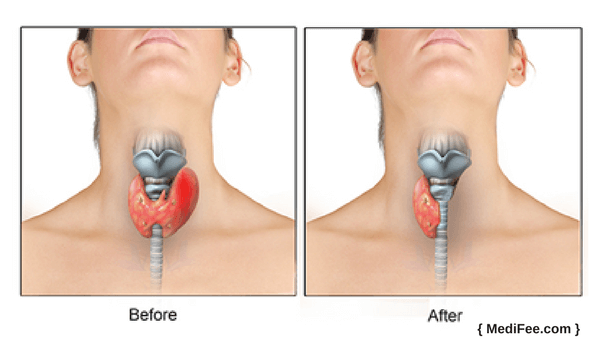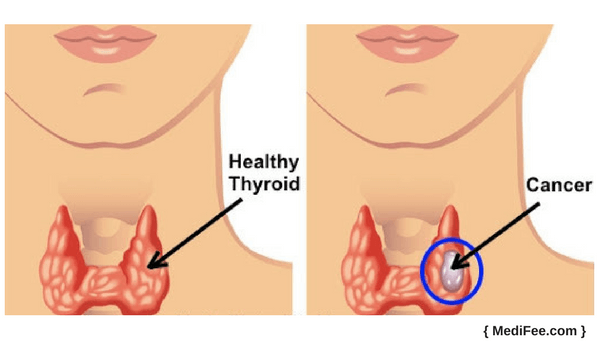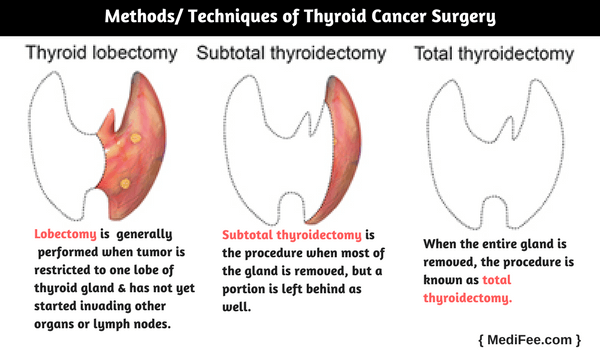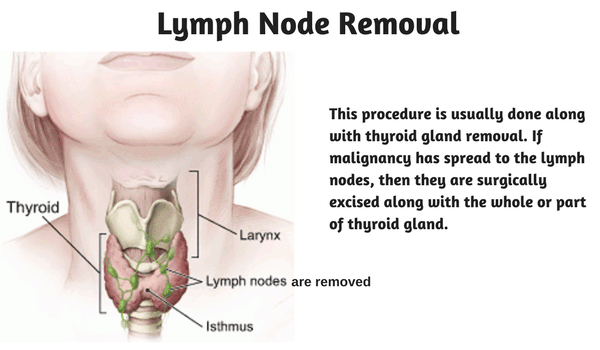Thyroid Cancer Surgery
Listed below is the step by step procedure of thyroid cancer surgery:
- What is Thyroid Cancer Surgery?
- Why is Thyroid Cancer Surgery Required?
- Pre-operative Preparation
- Day Before Surgery
- Procedure Day
- Methods/ Techniques of Thyroid Cancer Surgery
- Post Procedure
- Risks and Complications
What is Thyroid Cancer Surgery?
Thyroid cancer surgery is one of the modes employed for the treatment of malignant (cancerous) illness of thyroid cells. Cancer is a condition in which there is uncontrolled growth on the cells of a body tissue. This growth is unhealthy and can affect any part of the body. Cancer is a rather uncommonly seen in the thyroid gland. Diagnosis of thyroid cancer occurs fairly early. This makes it easier to treat.
Surgery of thyroid cancer includes all procedures undertaken with the aim to eliminate cancer from the body by surgically excising the diseased parts. These parts include thyroid, lymph nodes and other organs to which cancer might have spread. At times, the entire thyroid gland might have to be removed.

The oncosurgeon should have thorough knowledge of the structure of thyroid gland. The gland is situated in the front part of the neck near the wind pipe (trachea) and is centrally located. The esophagus also forms one of the neighboring organs of thyroid. While performing thyroid cancer surgery, the surgeon has to be careful to avoid injury to these organs.
Thyroid gland produces hormones, viz. Thyroxine, Tri-iodothyronine and Calcitonin. Thyroxine and tri-iodothyronine enable the smooth functioning of activities like respiration, metabolism, muscle activity. Calcitonin helps to maintain the balance of calcium levels. These points are important to be considered during thyroid cancer surgery. If a part or whole of the thyroid gland is removed during surgery, the levels of these hormones get disturbed. This has to be balanced with external hormonal therapy.
Why is Thyroid Cancer Surgery Required?
For treating any health condition, surgery is usually opted as the last resort if other modes of treatment fail. The same is true for thyroid cancer. There are other modes of treatment like medicinal and radiation therapy. If they fail to cure the symptoms or lessen the cancer, then surgery may be the chosen mode of treatment. At times, it may also happen that despite medicines and radiation therapy, the cancer may keep progressively worsening. In such situations, surgery needs to be performed to remove the cancerous body tissue and prevent its control and spread.

Some of the symptoms of thyroid cancer include pain in the throat, sensation of constriction, painful swallowing, difficulty while breathing. These usually occur due to the growing tumor which compresses the trachea (wind pipe) and esophagus (food pipe) which are situated adjacent to the thyroid. With surgery, the tumor can be removed to provide symptomatic relief. This will not cause complete elimination of the cancer but will form part of palliative therapy.
Thyroid tumors are usually small in the initial stages of cancer. Their surgical removal can be easily done and it will also ensure elimination of the cancer almost completely.
Thyroid cancer is a slow progressing condition. Surgery can be postponed if need be. But in the mean time, the cancer needs to be monitored for spread and growth regularly. This can be done by various investigative methods like sonography, MRI scan, CT scan, PET scan.
Pre-operative Preparation
Discussion with the patient:The decision to opt for surgical approach of treatment is taken by the doctor depending on the patient's age, general health, stage of thyroid cancer etc. Thyroid cancer surgeries are performed by oncosurgeons who are doctors having received specialized training in operating upon cancer cases. The surgical options need to be discussed with the patient and their immediate family.
Assembling the surgical team:Performing any surgery is not the job of one person. It requires a team of doctors and nurses alike. To perform thyroid cancer surgery, an oncosurgeon, an endocrinologist, a pathologist, an anesthetist and a highly skilled group of nurses must work together in a coordinated manner.
Day Before Surgery
Thyroid cancer surgery requires for the patient to be admitted into the hospital at least a day prior to the surgery. A few investigative tests are deemed necessary. The test results will determine if the patient is fit to undergo surgery. A complete blood count to determine hemoglobin, clotting time and bleeding, blood tests for determining blood sugar levels, thyroid functions, kidney functions, liver functions may be performed.
Blood group determination is also necessary. Thyroid is a highly vascular gland. This increases the risk of blood loss during the surgery. In such circumstances it is always better to have blood matching the patient's blood group ready for transfusion. An ECG is performed to determine the cardiac functioning. X-Ray of chest is usually done to give an idea about the health of lungs.
Thyroid surgery is done under the effect of general anesthesia. Therefore the patient is expected to have an empty stomach at least from the night prior to the surgery. When the patient is under the effect of general anesthesia, there is a chance of regurgitation of stomach contents. They may then get aspirated into the lungs which can create respiratory complications. A detailed physical examination report is prepared and sent to the surgeon. The blood pressure, respiratory rate, heart rate are monitored regularly.
Procedure Day
The patient is draped in sterile surgical gown and wheeled into the operating room before the scheduled time of surgery. A team of nurses and the anesthetist are already present in the operating room. The anesthetist makes an assessment of the patient's blood pressure, heart rate and breathing and starts administering the anesthetic medicine. Anesthesia can be administered in the form of respiratory fumes or injected into the veins. An artificial breathing tube is inserted into the trachea before the surgery. Throughout the surgery, monitoring of the vital parameters (blood pressure, pulse rate, breathing and body temperature) is done.
If open surgery is to be performed, skin over the area from where the surgical incision will be given is cleaned by shaving all hair over it. The skin is then cleaned with betadine which is an antiseptic solution. Once the anesthetist confirms that the anesthesia has completely set in, the surgery begins. A detailed description of each surgical procedure is given below.
Methods/ Techniques of Thyroid Cancer Surgery
Surgery is usually resorted to if there is no other option, or if all other treatment options have been tried and failed. Surgery involves a lot of pre planning. Surgery also needs the doctor to cut open the patient's body to access the internal diseased organ. A lot of time needs to be invested into the surgery before, during and after the process. Following are the three types of thyroid cancer surgeries:

Lobectomy
This procedure involves surgical excision of the cancerous lobe of thyroid. Lobectomy can generally be performed when the tumor is restricted to one lobe of thyroid gland and has not yet started invading other organs or lymph nodes. This procedure is also performed if biopsy fails to reveal presence of cancer. The lobe of the thyroid is removed and sent for pathological examination.
For lobectomy, an incision is made on the throat and underlying muscles are carefully separated. The affected lobe of thyroid gland is removed along with the tumor completely. Utmost care is taken to avoid damage to adjacent organs. The skin is then repaired by suturing it. A huge advantage of this surgery is that, the part of the healthy thyroid gland which is left behind, continues to perform normal thyroid functions.
Thyroidectomy
This is the surgery for removal of part or whole of thyroid gland. The procedure is essentially the same as lobectomy. Instead of just one lobe, if the entire gland is removed, the procedure is known as total thyroidectomy. When almost all of the gland is removed, it is known as near total thyroidectomy. Subtotal thyroidectomy is the procedure when most of the gland is removed, but a portion is left behind as well. This surgery can be opted for when the cancer has not spread to adjacent lymph nodes or organs.
Thyroidectomy can be done laparoscopically or by open method In the open method, a single incision suffices most of the times. It is given on the throat. The underlying tissue is incised till the thyroid is visible. The thyroid gland is removed and the skin is sutured back. Adjacent healthy part of thyroid and other organs are left undamaged. Laproscopicprocedure is also the same.. The only difference is that the surgical incisions made are multiple and small. A video camera is introduced inside the body through one incision. Thishelps the surgeon to visualize the thyroid gland well.
Lymph Node Removal
This procedure is usually done along with thyroid gland removal. If malignancy has spread to the lymph nodes, then they are surgically excised along with the whole or part of thyroid gland. It can also be done as a precaution when adjacent lymph nodes are cancer ridden. This will control the spread of cancer.

The thyroid is a highly vascular organ. This means it has many blood vessels passing through it. Therefore, while making the surgical incision, the surgeon has to be very careful to avoid excessive bleeding. Usually, while performing thyroid surgery, the patient is placed in 'Reverse-Trendelenburg position.' In this position, the patient is placed flat on the back with the feet tilted lower to the head. This prevents excessive blood flow to the thyroid gland; thus minimizing the risk of blood loss.
Post Procedure
Immediately After Surgery:Soon after surgery, the patient is transferred out of the operating room and placed under observation. After regaining consciousness, the patient's vitals are examined again and examination is done to assess the patient's general health.
Nutritional Status:An intravenous line may be inserted into the patient's arm. This is for providing adequate nutrition, as eating is prohibited for a few hours after surgery. When the patient regains consciousness, they are likely to experience some pain and a sensation of constriction in the throat.
Food Consumption:For the first few hours after surgery, the patient is kept on liquid diet. This is done to avoid unnecessary irritation to the throat. Soft solid food may then be started depending on the patient's comfort and recovery following the surgeon's advice.
Pain Medication:For the first few days after surgery, there maybe sensation of pain while swallowing or talking. Pain medication is prescribed for the same.
Antibiotics:Any surgical procedure tends to make the patient prone to contacting infections. Antibiotic medicines taken for a few days after surgery, prevent the development of these infections.
Wound Care:The incision which is given on the skin during surgery needs to be cared for. Regular follow ups with the surgeon are advisable. The surgeon will assess the wound and remove the sutures when complete healing has taken place.
Avoiding Infections:It is necessary to avoid infections; specially those which can lead to cough or cold. Continuous coughing is an irritant to the throat and may delay recovery after thyroid surgery. It is advisable to avoid venturing outside the home for a few days after surgery. Company of people who are already suffering from cough and cold should be avoided. If the patient feels even the slightest signs of cold or cough, home measure like steam inhalation should be done. A doctor should be consulted at the earliest.
Thyroid Medication:After thyroidectomy, the production of thyroid hormones reduces substantially. To restore this balance, hormonal therapy is usually administered. It is advisable to visit an endocrinologist for the same.
Calcium Medication:In case of medullary carcinoma (tumors having epithelial orgination), the patient may have to take calcium supplements to maintain blood calcium levels. Removal of thyroid gland following medullary carcinoma, hampers production of calcitonin.
Risks and Complications
Thyroid cancer surgery comes with some side effects. All of these effects are not essentially seen in every case, every time. The following side effects may be observed following thyroid cancer treatment:
Hoarseness of voice:
There may be accidental injury to the larynx (voice box) during surgery. This could lead to a horse voice which could be temporary or permanent. This could be modified with speech therapy.Breathing troubles:
The patient may experience difficulty in breathing due to accidental damage to the trachea (wind pipe) during surgery. Specific symptomatic treatment will provide relief to the patient.Hemorrhage:
As mentioned earlier, thyroid gland has extensive blood supply. If any large blood vessel gets accidentally cut during surgery, there could be excessive bleeding. In case of severe blood loss, transfusion may be needed.Hormonal imbalance:
After total thyroidectomy, the production of thyroid hormones stops completely. Due to this sudden drop in the hormone levels, functions like body temperature regulation, breathing, heart rate, metabolism, maintenance of calcium levels, get grossly disturbed. Treatment for these has been described above in the post-procedure section.
More information related to Thyroid Cancer Surgery
Best Onco-surgeons in India and top cities
Best Cancer hospitals in India

